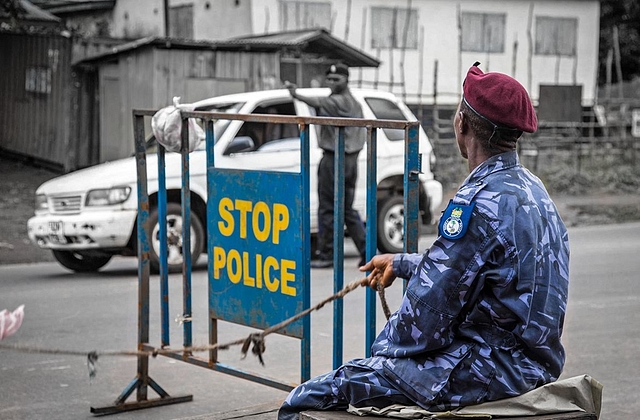
What A Lockdown To Fight Ebola In Uganda Taught This Noida Resident
Renu Pant’s experience in dealing with a lockdown imposed by Uganda in the wake of the Ebola virus makes her easily prepared for the Covid-19 shutdown. Here’s her story.
On 23 March, moments after Prime Minister Narendra Modi announced a nationwide lockdown to fight Covid-19. Among the millions who were watching the telecast of Modi's announcement, was Renu Pant, a homemaker and mother of two. She lives in an apartment in a housing complex in Noida, Uttar Pradesh.
Pant welcomed the stringent move. She felt relieved to hear the lockdown announcement. Panic has been no option for her even during bigger challenges that life has thrown. She strongly believes in ‘precaution’.
Moments after Modi's announcement, she briskly walked to her balcony. She says, “I quietly stood there, just to see how people living in the housing complex would respond to Modi ji's announcement. I saw people rushing out to buy essentials.”
She immediately grasped the length and breadth of the challenge of such a lockdown for herself. She would have to make do with what was available at home.
There is a sense of familiarity in the situation around the fight against Covid-19.
The 21-day lockdown would be the second such she is undergoing — joining other citizens in the fight against a rapidly contagious disease.
The first lockdown she had experienced to fight the spread of an infectious disease was in 2007-2008. It happened in Uganda, where Pant was living at that time. That particular lockdown was announced by the authorities in Uganda to fight the breakout of Ebola.
Centre for Disease Control and Prevention, under 'Emerging Infectious Diseases', says: ‘Ebola hemorrhagic fever (EHF) is a severe, often fatal disease of humans and nonhuman primates caused by a single-stranded RNA virus belonging to the Filoviridae family...’
For Pant, the lockdown for fighting Covid-19 is made up of actions she has practised before during the breakout of Ebola in Uganda. She shifted to India a few years ago.
Her daughter was born in 2007. She was a premature baby. This meant that the Pants (her husband works in Uganda) had to take extra care even at home and the Ebola outbreak would require them to be even more stringent.
For dealing with the world, the rules were simple. ‘Social distancing. Staying indoors. Keeping the main door shut at all times. Not even drying clothes outside. Washing every essential item — the packaging — which would come home, with detergent, before they entered home. Maintaining personal hygiene. Being alert about the intake of fruits and vegetables. No dependence on household helpers. Being happy with the regular intake of daal roti chawal,” she adds.
‘Darr’ (fear) is not a taboo in her dictionary when it comes to fighting a contagion looming outside. She shares her own dictum over the phone: ‘darogay to safe rahoge (when you fear it, you will work towards safety against it).’
Naturally, her preparations against the Covid-19 spread were saddled with a sense of urgency. “I would share Covid-19 awareness articles on a closed social networking group but people asked me ‘not to spread panic’, and hence I stopped. The neighbours would call my children out to play, but I would refuse to send them out,” she adds.
Pant made it a point to educate the house helper on Covid-19 and how it spreads. This was necessary to make her understand why she needs to be on paid leave. She adds, “She would tell me that others in the society ask her to come for work and everything is fine. Some explaining helped.”
From her apartment, she saw people going for a morning walk last week.
She swears by the awareness campaigns and public consciousness against infectious diseases in Uganda. She adds, “Strong awareness helps in making lockdowns against infectious diseases successful.” That awareness prepared her for 24/7 caution against Covid-19.